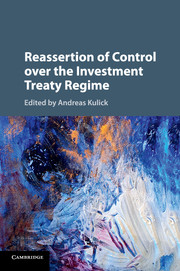Book contents
- Frontmatter
- Contents
- List of Contributors
- Preface
- PART I Introduction, Theory and Domestic Law Approaches
- PART II Procedural Aspects and Avenues of Reassertion
- PART III Substantive Aspects and Avenues of Reassertion
- PART IV Reassertion of Control: Policy and Trends
- 12 States' Reassertion of Control over International Investment Law: (Re)Defining ‘Fair and Equitable Treatment’ and ‘Indirect Expropriation’
- 13 How the European Commission and the EU Member States are Reasserting Their Control over Their Investment Treaties and ISDS Rules
- 14 Arbitrator Selection: Towards Greater State Control
- 15 Arbitrator (Issue) Challenge:What's the Real Issue?
- Index
14 - Arbitrator Selection: Towards Greater State Control
from PART IV - Reassertion of Control: Policy and Trends
Published online by Cambridge University Press: 12 January 2017
- Frontmatter
- Contents
- List of Contributors
- Preface
- PART I Introduction, Theory and Domestic Law Approaches
- PART II Procedural Aspects and Avenues of Reassertion
- PART III Substantive Aspects and Avenues of Reassertion
- PART IV Reassertion of Control: Policy and Trends
- 12 States' Reassertion of Control over International Investment Law: (Re)Defining ‘Fair and Equitable Treatment’ and ‘Indirect Expropriation’
- 13 How the European Commission and the EU Member States are Reasserting Their Control over Their Investment Treaties and ISDS Rules
- 14 Arbitrator Selection: Towards Greater State Control
- 15 Arbitrator (Issue) Challenge:What's the Real Issue?
- Index
Summary
A. Introduction
Two defining characteristics of international arbitration are the absence of a standing tribunal and the selection of the adjudicators by the disputing parties. Investment arbitral tribunals are constituted for particular cases with decision-makers appointed for one particular dispute only by the disputing parties directly or in accordance with their agreement. The lifetime of such tribunals comes to an end when they issue their final awards. By contrast, national courts or international tribunals, such as the International Court of Justice (ICJ), have a permanent existence, and their decision-makers are typically appointed for long, fixed terms or for life.
The principle of party autonomy has traditionally played a central role in arbitrator selection. ‘Party autonomy’ means that the composition of investment tribunals depends on the will of the disputing parties. Disputing parties have traditionally attached considerable weight to their input into the selection of arbitral tribunals. It gives them an important degree of influence to ensure that the arbitral tribunal includes qualified members and that the tribunal will fully and diligently consider their arguments.
The long-standing principle is that it is up to the disputing parties to select the arbitrators for appointment to arbitral tribunals – severally for party-appointed arbitrators and jointly for presiding arbitrators. As a result, investment disputes are not decided by adjudicators assigned to those disputes according to some formula or even randomly, as is commonly the case with judges on domestic courts. Rather, the parties select the make-up of their investment tribunals.
To the disputing parties, their influence in choosing the arbitrators is one of arbitration's main attractions vis-à-vis national courts and other forms of dispute resolution. Party input into arbitrator selection remains a condition for the litigants to regard the tribunal as legitimate and as a viable alternative to domestic courts. In part, the appeal of arbitration relative to national courts depends on the arbitrators selected to decide these disputes reflecting the preferences of both parties. By opting for arbitration, the disputing parties minimise the risk of their dispute being decided by judges who may lack specialised expertise for their dispute or who may be perceived as biased decision-makers because they are embedded in a national legal system, particularly the host country's legal system.
- Type
- Chapter
- Information
- Reassertion of Control over the Investment Treaty Regime , pp. 333 - 355Publisher: Cambridge University PressPrint publication year: 2016
- 4
- Cited by



